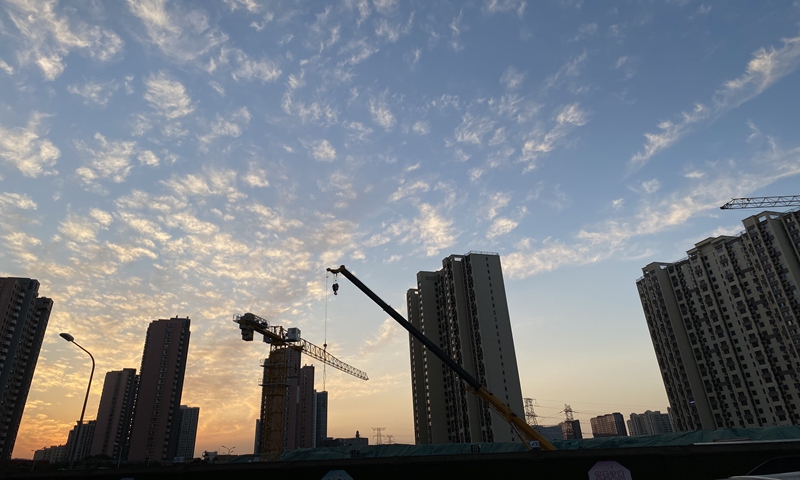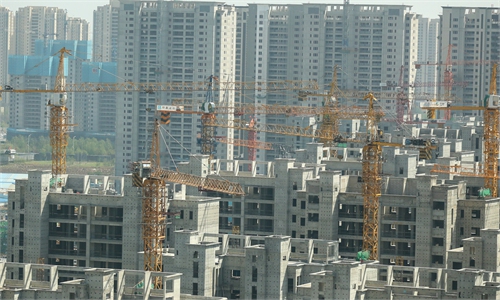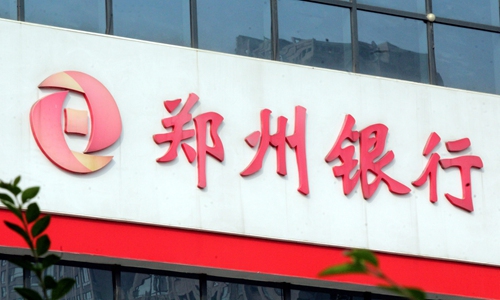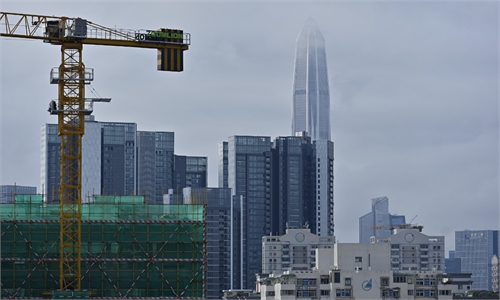China's investment in property development drops 7.4% y-o-y between Jan-Aug, but signs of improvement emerge

Cranes are seen at a construction site of a housing complex in Beijing. Photo: VCG
China's investment in property development over the first eight months of the year dropped 7.4 percent year-on-year to 9.08 trillion yuan ($1.29 trillion), with slump expanding 1 percentage point from the January-July period, mirroring a heightened downward pressure on the sector as real estate developers continued to struggle with liquidity and project delivery issues.
But signs of a mild recovery have emerged, as a number of measures have been rolled out across the country to boost housing demand, and as the government's swift plan to restart stalled property projects gradually took effect to stabilize market confidence, analysts said. They noted that China's property market will maintain stable operation and won't pose systematic financial risks to the world's second-largest economy.
Over the first eight months of 2022, residential property investment plunged 6.9 percent year-on-year, according to data released by the National Bureau of Statistic (NBS) on Friday.
Sales of commercial housing in terms of area and revenue dived 23 percent and 27.9 percent year-on-year in January-August period respectively, NBS data showed, narrowing 0.1 percentage point and 0.9 percentage point from the readings in the first seven months.
Among 70 large and medium-sized Chinese cities, 50 recorded price drops from July for new homes, and 56 reported price decline for second-hand homes, an increase of 10 cities and 5 cities from July, respectively, according to NBS data.
In August, new home prices in first-tier cities rose 0.1 percent on a monthly basis, while second-hand house prices remained unchanged from July.
Observers said that the slew of data in August underscores the urgency to stabilize property investment and prevent the index from derailing China's overall fixed-asset investment.
"Due to a strained capital pool, real estate developers lack the incentive to purchase land and start new projects, and stimulus should emphasize on these two fronts," Yan Yuejin, research director at Shanghai-based E-house China R&D Institute, told the Global Times on Friday.
According to Yan, a reduction in the decrease rate of property sales in August provided a positive sign as it points to a recovery on the demand side amid government's ongoing house easing measures. "A revived demand side also bodes well that property sales will continue improving and house prices won't fall off a cliff in the following months," he said.
Various local governments have reportedly issued at least 70 property stimulus and relaxing measures, as part of efforts to defuse market risks and tackle the issue of unfinished residential projects.
China's Ministry of Housing and Urban-Rural Development, together with the Ministry of Finance and the People's Bank of China, the country's central bank, have launched special measures to support cities seeking to address the construction and delivery of stalled residential projects by rolling out special loans offered by the country's policy banks.
So far, at least 10 cities including Zhengzhou, Nanning, Huzhou and Shaoxing have introduced policies such as bailout funds to stabilize local property market and boost market confidence, according to media reports.
On Tuesday, China Evergrande Group pledged to resume construction on 38 developments by September 30, out of the total 706 property projects it vowed to ensure delivery. The developer said work has resumed on the remaining 668 projects.
Policies ensuring housing delivery are an important manifestation of government's determination on stabilizing economic fundamentals and people's livelihood, according to a commentary by the Securities Daily published on Friday.
In August, the Chinese economy has recorded a better-than-expected growth and maintained recovery momentum. Fixed-asset investment in the first eight months grew 5.8 percent year-on-year, a slight increase from the 5.7-percent growth in January to July.
Global Times



